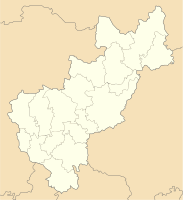Tequisquiapan
| Tequisquiapan | ||
|---|---|---|
|
Coordinates: 20 ° 31 ′ N , 99 ° 54 ′ W Tequisquiapan on the Queretaro map
|
||
| Basic data | ||
| Country | Mexico | |
| State | Querétaro | |
| Municipio | Tequisquiapan | |
| City foundation | 1551 | |
| Residents | 29,799 (2010) | |
| City insignia | ||
| Detailed data | ||
| surface | 11.6 km 2 | |
| Population density | 2,569 inhabitants / km 2 | |
| height | 1880 m | |
| Tequisquiapan - Iglesia Santa María de la Asunción | ||
Tequisquiapan is a city with about 30,000 inhabitants and the administrative seat of the municipality of the same name (municipio) with a total of about 70,000 inhabitants in the southeast of the Mexican state of Querétaro . Because of its historic city center, it is one of the Pueblos Mágicos .
location
Tequisquiapan is located in the central highlands of Mexico at an altitude of approx. 1880 m . Santiago de Querétaro , the capital of the state, is about 62 km to the west; Mexico City, the capital of the whole country, is about 260 km to the southeast. The climate is temperate; Rain (approx. 515 mm / year) falls almost exclusively in the summer months.
Population development
| year | 2000 | 2005 | 2010 |
| Residents | 25,929 | 26,358 | 29,799 |
The slight increase in population is mainly due to the immigration of families and individuals from the surrounding villages. Most of the community's residents, who are often Native American and Nahuatl- speaking, also speak Spanish.
economy
Cattle are farmed in the villages of the municipality, along with corn, wheat, beans, vegetables and, since the 1960s, also wine; there are also numerous fruit trees. An important economic factor in the region are several opal mines (opaleras) with attached grinding shops . In the city itself, several trade shops as well as craft and service companies have settled.
history
In the 13th century the Chichimecs and the Otomí Indians invaded the area, but they were partially ousted in the 15th century by the expanding Aztecs , who in turn had to give up their power after the victory of the Spanish.
Attractions
- The historic center of the city , around the Plaza Hidalgo with its arcades (portales) , still exudes a certain colonial charm.
- The Church of Santa María de la Asunción is dedicated to the Assumption of Mary ; Construction began at the end of the 17th century, but was not completed until 1874. While the middle section of the facade is quite richly structured, the builders, as usual, did without a similar design for the basement of the bell tower ; only the two floors in the upper part are open in all directions. The interior of the church is single-nave and vaulted; the yoke in front of the flat apse is spanned by a windowed dome .
- In Parque La Pila , about 500 m north of the main square, there is still a section of an aqueduct built by the Spaniards .

